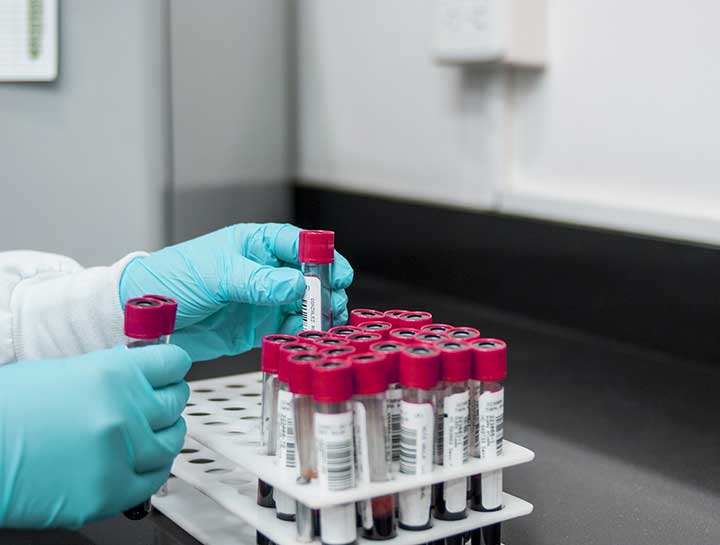Hematology and Biochemical Analysis
The study of blood
Simply put, hematology is the study of blood. The blood contains three main cell lines: red blood cells, white blood cells, and platelets. A Complete Blood Count (CBC) is a diagnostic test that gives us a detailed report of each category of cells. The most common hematologic (blood) disorder that we see is anemia, which is a decrease in red blood cells. Red blood cells are responsible for carrying oxygen to the organs and tissues of the body, so a decrease in their supply is very detrimental to a pet. Many times the decrease in red blood cells occurs suddenly, leaving the pet lethargic, weak, or even collapsed. This can happen due to the red blood cells being lost (ie. your pet is bleeding externally or internally from somewhere) or from internal red blood cell destruction. Destruction of red blood cells frequently results from an attack on the cells by your pet’s immune system, which may be initially triggered by a variety of causes. Red blood cell destruction can also be caused by a number of blood parasites. Furthermore, anemia may develop as a result of organ problems, cancer, or bone marrow disease. Because anemia can rapidly develop into a life-threatening condition, successful diagnosis and management of an anemic pet are critical.
People commonly think of the white blood cells and their increase as a marker of infection, but white blood cells are also evaluated to help diagnose stress, inflammatory conditions, as well as some cancers. Diseases affecting platelets (and/or blood clotting factors) will frequently result in coagulopathy, which is an inability to clot one’s blood. This condition can be life-threatening and therefore result in an extremely ill pet. Some of the first signs we may see in a pet with coagulopathy are pale gums and/or red spots or bruising on the skin. While there are many causes of coagulopathy, a common cause that we see is the ingestion of certain types of rat poison. This is a true medical emergency, and your pet should be seen immediately if they have ingested this substance. As with any suspected toxin ingestion, it is recommended that you always bring the packaging of the toxin with you when your pet comes to the hospital.
While a CBC evaluates your pet’s cell lines, a biochemical analysis (frequently referred to as a chemistry panel) evaluates your pet’s organs. The size and extent of the chemistry panel that is ordered for pets may vary depending on the pet’s age, medication, health status, breed, or current medical symptoms. In addition, different chemistry panels may be ordered prior to your pet undergoing anesthesia and/or surgery. When pets are receiving certain medications, or when a veterinarian is managing your pet’s medical problem, a chemistry panel may be necessary in order to properly monitor their treatment. More extensive chemistry panels typically analyze the acid-base balance in your pet’s body, as well as assess multiple liver and kidney enzymes, protein, mineral, lipid, and electrolyte levels. Depending on your pet’s current symptoms, more advanced testing may need to be completed in order to evaluate your pet’s pancreas, hormones, clotting ability, medication levels, antibody titers, etc.
With the ongoing advancements in veterinary medicine and the serious nature of many blood diseases, it is important that you select a veterinary team that has the interest and knowledge to correctly interpret your pet’s laboratory data in order to formulate an effective treatment plan for them. The highly trained veterinarians at Polo Springs have diagnosed and successfully managed countless patients with a multitude of blood disorders. In addition to having the diagnostic equipment at our fingertips, we have the experience and expertise to help get you and your pet through a crisis.
And please don’t ever hesitate to ask us questions, because we are here to help you every step of the way. Call us at (719) 264-8384.

